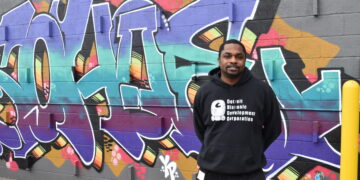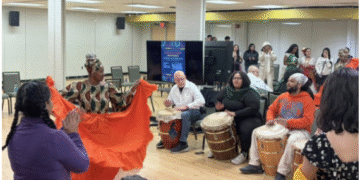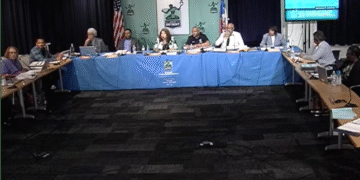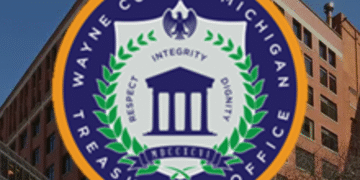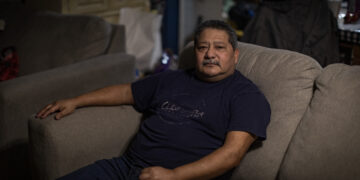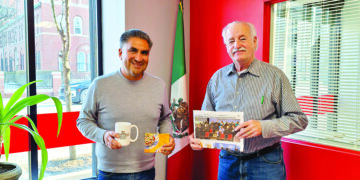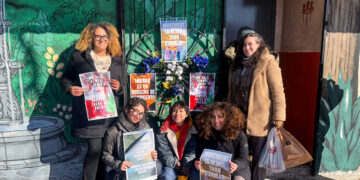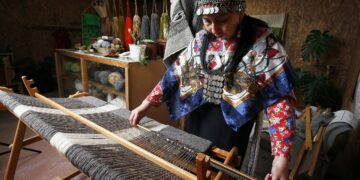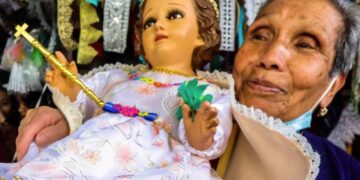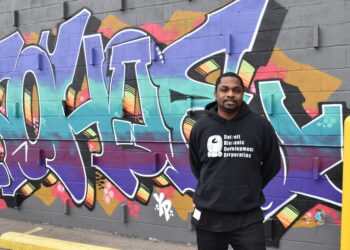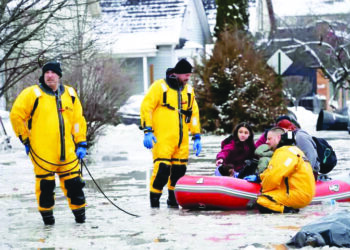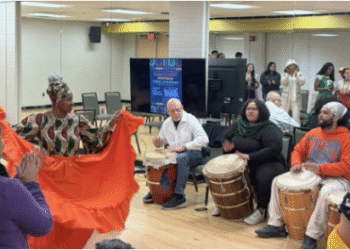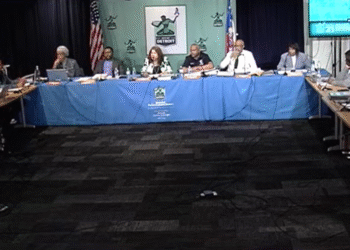Earlier this month, Detroit Future Ops was announced as one of the Motor City Match Round 21 Cash Grant awardees. They were awarded a cash grant of $65,000 which they plan to use to complete construction for their Design Build Green Hub. Located at 1326 18th Street, the hub will be the home base for Detroit Future Ops (DFO). “The project is an inclusive building physical space but also an anchor mission to preserve neighborhood culture and create tangible opportunities for Detroiters,” says Founder Tanya Saldivar-Ali.
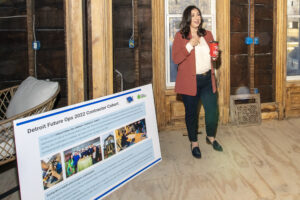
After 15 years in the construction industry as the Business Development Director & Co-Founder of AGI Construction, Tanya Saldivar-Ali has been instrumental in transitioning AGI from general contractor to development. Tanya and her husband MsSgt Luis Ali, co-founded AGI Construction in 2008. The roots of AGI Construction go further back to Luis’ uncle, a union carpenter in Detroit. His uncle first proposed that Luis consider becoming an electrician when he moved back to Detroit in 2001 after serving in the US Air Force straight out of high school. MsSgt Ali recently retired from a military heavy construction unit called Red Horse with 26 years of service in the USAF.
They “lived and learned through a lot of hard lessons with trying to grow our business” said Tanya. “We realized just having all the certifications wasn’t enough to grow in scale. We were experiencing a lot of barriers and challenges with access to capital, direct, opportunity, mentorship, and really understanding how to scale to the next level”.
Tanya credits a mentorship opportunity through Frank Venegas from Ideal Group for empowering AGI Construction to “really figure out where do we fit and where do we make the most impact”. In 2016-2017 AGI Construction was given the opportunity to build out the 6,000 sq ft basement of Cristo Rey High School, at 5679 Vernor Hwy. This was a “sink or swim” moment and they used 90 percent Detroit contractors doing everything from electrical, plumbing, to foundation and ordering kitchen appliances. By the end of the project, AGI Construction “realized that these were the kinds of projects that we wanted to focus on”.
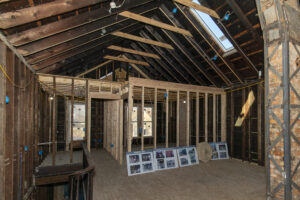
Tanya and Luis made the intentional decision to be more than “a check off the list as a minority business” to “really create impact in our own neighborhoods by building out spaces for amazing programs that people need, to give people access to beautiful buildings, or affordable projects”. The ongoing skilled trades shortage made things even more difficult because like other construction firms they were trying to build out projects and “it was too much work and not enough workers.” During this time is when Tanya began to realize that if they didn’t secure a permanent homebase that they “would not be able to stay rooted in Southwest Detroit”.
In the 47 years that Tanya has lived and worked in Southwest Detroit, she had never witnessed gentrification. When speaking about the neighborhood Tanya said, “It has always been a beautiful community, we’ve always had a strong corridor, we’ve always had a strong small business community. Filled with beautiful people, and a lot of culture.” It took her some time to realize what was going on in Detroit because like many legacy Detroiters, she “had always known Detroit in a downturn”. When the reality of being displaced set in, it fueled her fire to say “we belong, we deserve to stay in our own community.” It is the collection of Tanya’s lived experiences, which she summarized as “Southwest love” that is the catalyst and what drove her to found Detroit Future Ops.
Doing what Detroiters do best, Tanya and Luis got to work. They acquired the property at 1326 18th St, a Queen Ann house, and started working with the surrounding community for over two years doing everything from door knocking to partnering with youth in the development process. Tanya recounts that “We wanted to know how they felt about all the development that was happening in their neighborhoods, how did they feel about us occupying this space”. She understood they were “making a small development within our community and recognizing what does it mean to respectfully engage with our residents and asking them for input and including people in those opportunities”. It was this thought process that became the mission of Detroit Future Ops (DFO). With Tanya’s vision leading the way, “DFO became the social arm of AGI Construction with engaging locals in the development process and opportunities”.
This is where Motor City Match (MCM) comes in. The MCM program provided the gap funding they needed to complete the work on the project. The project has been in the works for four years through city zoning, community engagement, and the COVID pandemic. “All those challenges made it much more complicated and frustrating while seeing others come in, access resources, and complete projects in months. Hence, the name and mission of the project became the Design Build Green Hub,”said Tanya.
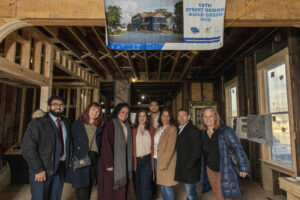
Last January DFO launched a pilot program with five local contractors who committed to building out the Design Build Green Hub. The idea behind the hub is to “streamline and share the process with others by providing direct opportunities to direct opportunities”. The hub will focus on strengthening Detroit’s design-built environment with a mission to create sustainable communities.
The pilot program for DFO provides “hands-on building components, learning from each other, mentorship and exposure to projects”. The five small minority owned contractors are: Ramirez Remodeling; Navarro Construction; Phase Construction; On the Level Plumbing, and Nica Construction.
To date they have completed 70% of the work on the Design Build Green Hub. The cash grant award from MCM means that they now have the gap funding to “bring the crew back together and finish out this project”, says Tanya. The project needs insulation and all then all the interior finishes before launching by the end of Spring-early Summer.
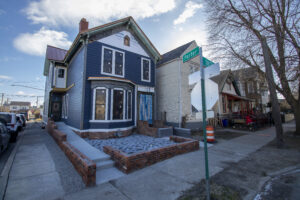
Tanya noted MCM as “one of the most effective tools when we think of opportunities for small business owners to acquire cash grants’” and a “powerful program” that can help to create long term generational wealth for Detroiters. There are two types of assistance awards MCM offers. Tanya emphasized “really working with Motor City Match ASAP and sticking with them through the different phases they have.” MCM provided this seasoned business woman “the support to move into a brick and mortar”.
Tayna says, “what’s amazing is that it’s not a loan. They are not offering us more debt. They’re actually providing us a grant that gives us an extra resource that allows us to keep equity in our business or in our properties.”
She stressed that MCM was a way to “stay rooted in community” and believes it can mitigate business “displacement or feelings of not being included in the building in Detroit. It is there as a resource and local legacy Detroiters should take advantage of that”.
For more information on the Design Build Green Hub visit: http://www.detroitdesignbuildgreenhub.com/.
For more information on Motor City Match visit: https://www.motorcitymatch.com/
Irma Maribel Andrade is a born and raised Detroiter; she is passionate about “lifting others as you climb”. She is a daughter of immigrants from San Luis Potosi, Mexico and a first generation college graduate from UM-Ann Arbor currently pursuing a Masters in Social Work. When she is not studying, Irma spends her time gardening, crafting, advocating for social justice and being wife & mom of two.
Reconstruyendo el barrio: Detroit Future Ops
A principios de este mes, Detroit Future OPS (Operaciones Futuras de Detroit) fue anunciado como uno de los ganadores, de la subvención de la Ronda 21 de Motor City Match, otorgándoseles 65,000 USD en efectivo, que planean usar para completar la construcción de su Diseño de Construcción Green Hub (Centro Verde). Ubicado en 1326 calle 18°, el cual será la base de operaciones de Detroit Future OPS (DFO por sus siglas en inglés). “El proyecto es un espacio físico de construcción inclusivo, con una misión fundamental de preservar la cultura del vecindario y crear oportunidades tangibles para los habitantes de Detroit”, anunció la fundadora Tanya Saldivar-Ali.

Después de 15 años en la industria de la construcción como Directora de Desarrollo Comercial y cofundadora de AGI Construction, Tanya Saldivar-Ali ha sido una pieza fundamental en la transición de AGI como empresa contratista a empresa de Desarrollo de Proyectos. Tanya y su esposo, el sargento Luis Ali, cofundaron AGI Construction en 2008, remontándose tío del Sr. Luis Ali, un carpintero sindicalizado en Detroit. En primera instancia su tío le propuso a Luis que considerara convertirse en electricista cuando regresó a Detroit en 2001, después de servir en la Fuerza Aérea de los EE. UU. justo después de terminar la escuela secundaria, sin embargo, el Sr. Ali se retiró recientemente de una unidad militar de construcción pesada llamada Red Horse con 26 años de servicio en la USAF.
“Ellos vivieron y aprendieron muchas lecciones difíciles al tratar de hacer crecer nuestro negocio…Nos dimos cuenta de que tener todas las certificaciones no era suficiente para crecer en escala. Estábamos experimentando muchas barreras y desafíos con el acceso al capital, la oportunidad directa, las tutorías y realmente entendíamos cómo escalar al siguiente nivel”, dijo Tanya.
Tanya acredita unas mentorías por medio de Frank Venegas de Ideal Group para capacitar a AGI Construction para “descubrir realmente dónde encajamos y dónde tenemos el mayor impacto”. En 2016-2017, AGI Construction tuvo la oportunidad de construir el sótano de 6,000 pies cuadrados de la escuela secundaria Cristo Rey, en 5679 Vernor Hwy. Este fue el momento de “hundirse o nadar” y utilizaron un 90 por ciento de contratistas de Detroit para hacer todo, desde electricidad, plomería, hasta cimientos y electrodomésticos de cocina. “Al final del proyecto, AGI Construction se dio cuenta de que estos eran los tipos de proyectos en los que quería centrarse”.

Tanya y Luis tomaron la decisión intencional de ser más que “una marca en la lista de negocios minoritarios” para realmente crear un impacto en su propio vecindario, mediante la construcción de espacios para programas increíbles que la gente necesitaba, para darles acceso a hermosos edificios, o proyectos asequibles. La continua escasez de trabajadores calificados, hizo las cosas aún más difíciles pues, al igual que otras empresas de construcción, estaban tratando de sacar proyectos a flote, tenían demasiado trabajo y no había suficientes trabajadores. Durante ese tiempo, Tanya comenzó a darse cuenta de que, si no aseguraban una base de operaciones permanente, no podrían permanecer arraigados al suroeste de Detroit.
En los 47 años que Tanya ha vivido y trabajado en el suroeste de Detroit, nunca había sido testigo de la gentrificación (renovación de una zona urbana). Al hablar sobre el vecindario, Tanya dijo: “Siempre ha sido una comunidad hermosa, una comunidad sólida de pequeñas empresas, llena de gente linda, y mucha cultura.” Le tomó algún tiempo darse cuenta de lo que estaba pasando en Detroit porque, como muchos habitantes heredados de Detroit, “siempre había visto a Detroit en una recesión”. Cuando la realidad de ser desplazada se estableció, alimentó su fuego para decir “pertenecemos, merecemos permanecer en nuestra propia comunidad”. Es la colección de las experiencias vividas de Tanya, que resumió como “amor al sudoeste”, que es el catalizador y lo que la llevó a fundar Detroit Future OPS.
Haciendo lo que mejor saben hacer los habitantes de Detroit, Tanya y Luis se pusieron a trabajar. Adquirieron la propiedad en 1326 calle 18°, una casa Queen Ann, y comenzaron a trabajar con la comunidad circundante durante más de dos años haciendo de todo, desde tocar puertas, hasta asociarse con jóvenes en el proceso de desarrollo. Tanya cuenta “Queríamos saber cómo se sentían acerca de todo el desarrollo que estaba ocurriendo en sus barrios y de que ocupáramos este espacio”. Ella entendió que estaban “haciendo un pequeño desarrollo dentro de la comunidad y reconociendo lo que significa comprometerse respetuosamente con los residentes, pidiéndoles su opinión e incluir a las personas en esas oportunidades”. Fue este proceso de pensamiento el que se convirtió en la misión de Detroit Future OPS (DFO). Con la visión de Tanya a la cabeza, DFO se convirtió en el brazo social de AGI Construction al involucrar a los locales en el proceso y las oportunidades de desarrollo.
Aquí es donde entra en juego Motor City Match (MCM). El programa MCM proporcionó la financiación del déficit que necesitaban para completar el trabajo del proyecto. El proyecto ha estado en proceso durante cuatro años a través de la zonificación de la ciudad, la participación comunitaria y la pandemia de COVID. “Todos esos desafíos lo hicieron mucho más complicado y frustrante al ver a otros entrar, acceder a recursos y completar proyectos en meses. Por lo tanto, el nombre y la visión del proyecto se convirtió en Design Build Green Hub”, dijo Tanya.

En enero pasado, DFO lanzó un programa piloto con cinco contratistas locales, que se comprometieron a construir Design Build Green Hub. La idea detrás del centro es agilizar y compartir el proceso con otros, brindando oportunidades directas a Potencias Directas. El centro se centrará en fortalecer el entorno construido en Detroit con la misión de crear comunidades sostenibles.
El programa piloto para DFO proporciona componentes de construcción prácticos, aprendí- zaje mutuo, tutoría y exposición de proyectos. Los cinco pequeños contratistas propiedad de minorías son: Ramirez Remodeling; Navarro Construction; Phase Construction, On The Level Plumbing y Nica Construction.
Hasta la fecha, se ha completado el 70% del trabajo de Design Build Green Hub. El premio recibido por parte de MCM, hace que puedan superar el déficit para reunir al equipo y terminar este proyecto informó Tanya; el cual necesita aislamiento y todos los acabados interiores, antes de lanzarse a finales de primavera y principios de verano.

Tanya señaló que MCM es un Programa Poderoso que cuenta con dos tipos de Premios de Asistencia y una de las herramientas más efectivas cuando se piensa en oportunidades para que los propietarios de pequeñas empresas, adquieran subvenciones en efectivo, que puedan ayudar a crear riqueza generacional a largo plazo para los habitantes de Detroit. Tanya enfatizó lo bueno que es trabajar con Motor City Match, desde que se tiene la oportunidad y permanecer con ellos en las diferentes fases que tienen. MCM brindó a esta experimentada mujer de negocios el apoyo para mudarse a un edificio de ladrillo y cemento.
Tanya concluye diciendo: “lo asombroso es que no es un préstamo. No nos están ofreciendo una deuda, nos están proporcionando una subvención que nos brinda un recurso adicional, que nos permite mantener la equidad en nuestro negocio o en nuestras propiedades”.
Hizo hincapié en que MCM era una forma de permanecer arraigado a la comunidad y cree que puede mitigar el desplazamiento o la sensación de no estar incluido en el Detroit de los negocios. Está allí como un recurso a los habitantes de Detroit, quienes deberían aprovechar eso”.
Para obtener más información sobre Design Build Green Hub, visite: http://www.detroitdesignbuildgreenhub.com/.
Para obtener más información sobre Motor City Match, visite: https://www.motorcitymatch.com/
Irma Maribel Andrade nació y creció en Detroit; le apasiona “ayudar a otros mientras escala”. Es hija de inmigrantes de San Luis Potosí, México y ha sido la primera en su familia en graduarse de la universidad, de UM-Ann Arbor, actualmente cursa una Maestría en Trabajo Social. Cuando no está estudiando, Irma dedica su tiempo a la jardinería, las manualidades, la defensa de la justicia social y a ser esposa y madre de dos hijos.


